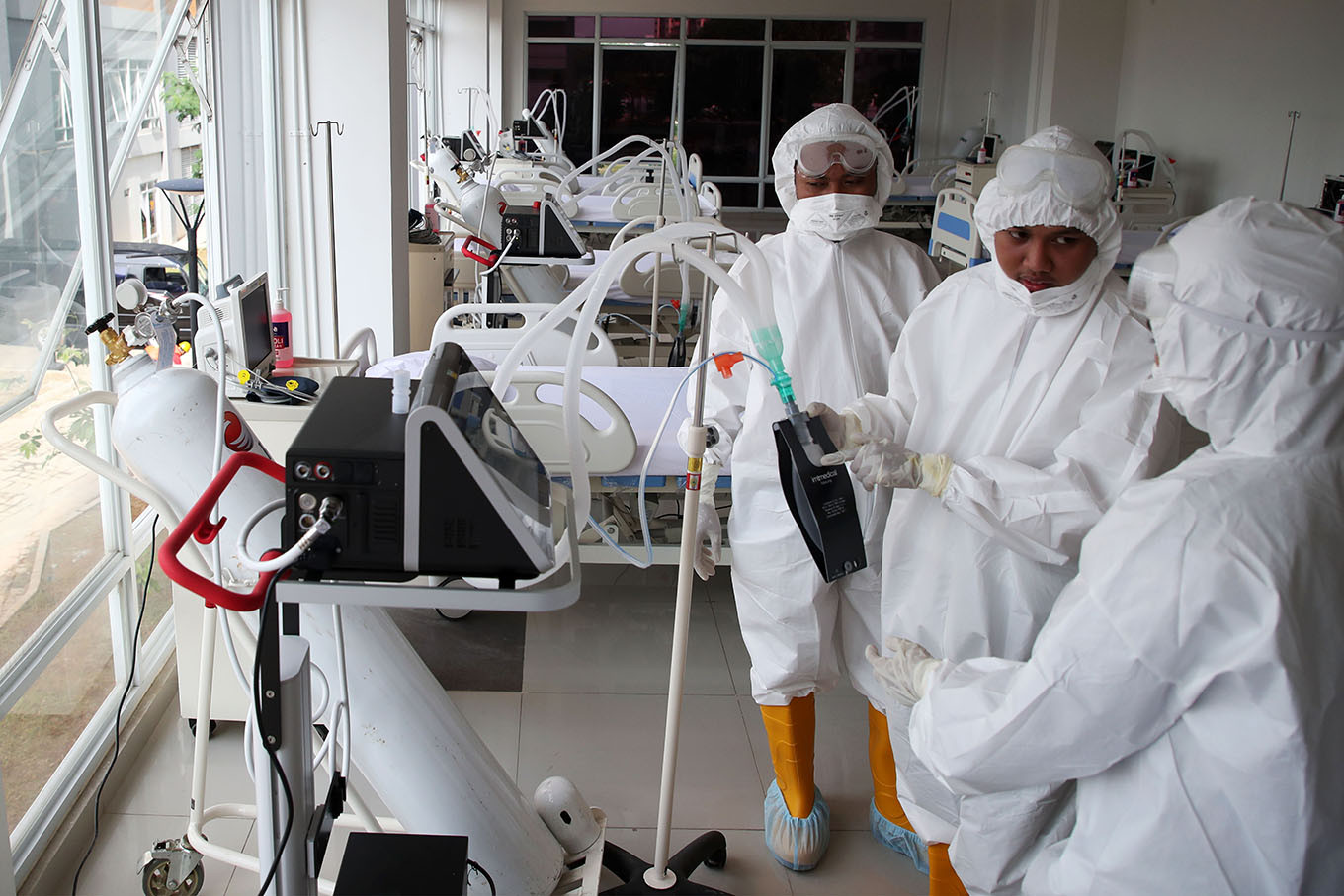Popular Reads
Top Results
Can't find what you're looking for?
View all search resultsPopular Reads
Top Results
Can't find what you're looking for?
View all search resultsEquitable measures to defeat coronavirus pandemic
Half of the world’s population lacks access to basic health care. Therefore, any outbreak of the virus in a country with limited resources could be devastating.
Change text size
Gift Premium Articles
to Anyone
 Medical staff check the readiness of the equipment in the ICU room of the Covid-19 Emergency Hospital at Kemayoran Atlet Hospital, Jakarta, Monday, March 23, 2020. President Joko Widodo who has conducted a review of this place ensures that this emergency hospital is ready to be used for quarantine and treatment of Covid patients -19. The Athlete House has a capacity of 24 thousand people, while currently it has been prepared for three thousand patients. (Kompas/Pool/Heru Sri Kumoro)
Medical staff check the readiness of the equipment in the ICU room of the Covid-19 Emergency Hospital at Kemayoran Atlet Hospital, Jakarta, Monday, March 23, 2020. President Joko Widodo who has conducted a review of this place ensures that this emergency hospital is ready to be used for quarantine and treatment of Covid patients -19. The Athlete House has a capacity of 24 thousand people, while currently it has been prepared for three thousand patients. (Kompas/Pool/Heru Sri Kumoro)
C
oronavirus hits without discrimination. Yet, it is clear that vulnerable people — the poor, those with disabilities, informal workers and migrants — may not be able to survive the pandemic. These groups are facing a confluence of impacts on their health and livelihoods, such as high rates of malnutrition, food insecurity and the struggle to afford goods necessary for subsistence. They risk losing their lives and livelihoods even after the outbreak is over.
Half of the world’s population lacks access to basic health care. Therefore, any outbreak of the virus in a country with limited resources could be devastating. Transparent and proactive governments and partnership in public health care and promotion will not only minimize health impacts but also minimize the long-term economic impact of the virus. Enhancing preventive and curative measures to manage the outbreak is critical for both reasons.
The Health Ministry has prepared 362 hospitals using resources from the Indonesian Military (TNI), the police, stateowned hospitals and three private hospitals. It is urgent to enable more private health facilities and faith-based healthcare networks to assist in high-risk regions.
Healthcare equity for the poor is paramount to assure their participation in reducing the virus’ spread, through full coverage of services, provision of information on how they can and should access those services, transportation access and mandatory sick allowance to complement living costs during the crisis.
As of March 23, the world had 294,100 COVID-19 cases, and Indonesia had 579 cases with no sign of slowing down.
Emergency supplies of basic medical equipment are in high demand. The government should prepare not only enough hospital beds but also sufficient healthcare workers.
About 70 percent of healthcare workers globally are women. Clean running water and soap are the best protector, yet 33.4 million people in Indonesia have no access to water. In areas where it is difficult to get clean water, women spend between 1 to 3 hours collecting water for the family.
Apart from unpaid care work at home and in the community, women will be among the first to be impacted by the outbreak, as they will be bound to care for sick relatives and look after children.
Policies to enforce labor rights are equally important. Informal workers are less likely to be entitled to sick pay or to be able to work from home. Self-quarantine will drag people further into poverty.
Women are more likely to take time off of work to care for the family. Loss of income will impact the ability to fight the crisis, as the prices of food and other essentials will rise dramatically if the government does not enact measures to control the market. Micro and small enterprises may not be able to survive. Big corporations may lay off workers, leading to massive unemployment.
Decentralization of resources, access to information and clarity of coordination will ease the partnership between stakeholders to manage the crisis.
The private sector must respond to the crisis mostly with the perspective of a development actor, on top of business orientation. Religious and community leaders must enforce social distancing and good referral systems, to support people with disabilities, pregnant women, infants and the elderly. Community-based surveillance for contact monitoring and self-quarantine support must be established.
The virus will continue to hurt the economy. Contingency funds and reallocating the state budget for COVID-19 management may not be enough.
Solidarity from the global community will be tested in shouldering the risks and burdens that individual countries face.
Debt offers, while empathetic, are irrational. Poor countries will be sent into debt and further poverty. Instead of debt, aid and direct support should be offered where possible. When a country fails to manage the outbreak, it will directly affect the rest of the world. Economic architecture should really look at how to care for humanity.
This is the time when we need to see concrete action from both state and nonstate actors to leave no one behind, from local to global.
***
Country director of Oxfam










